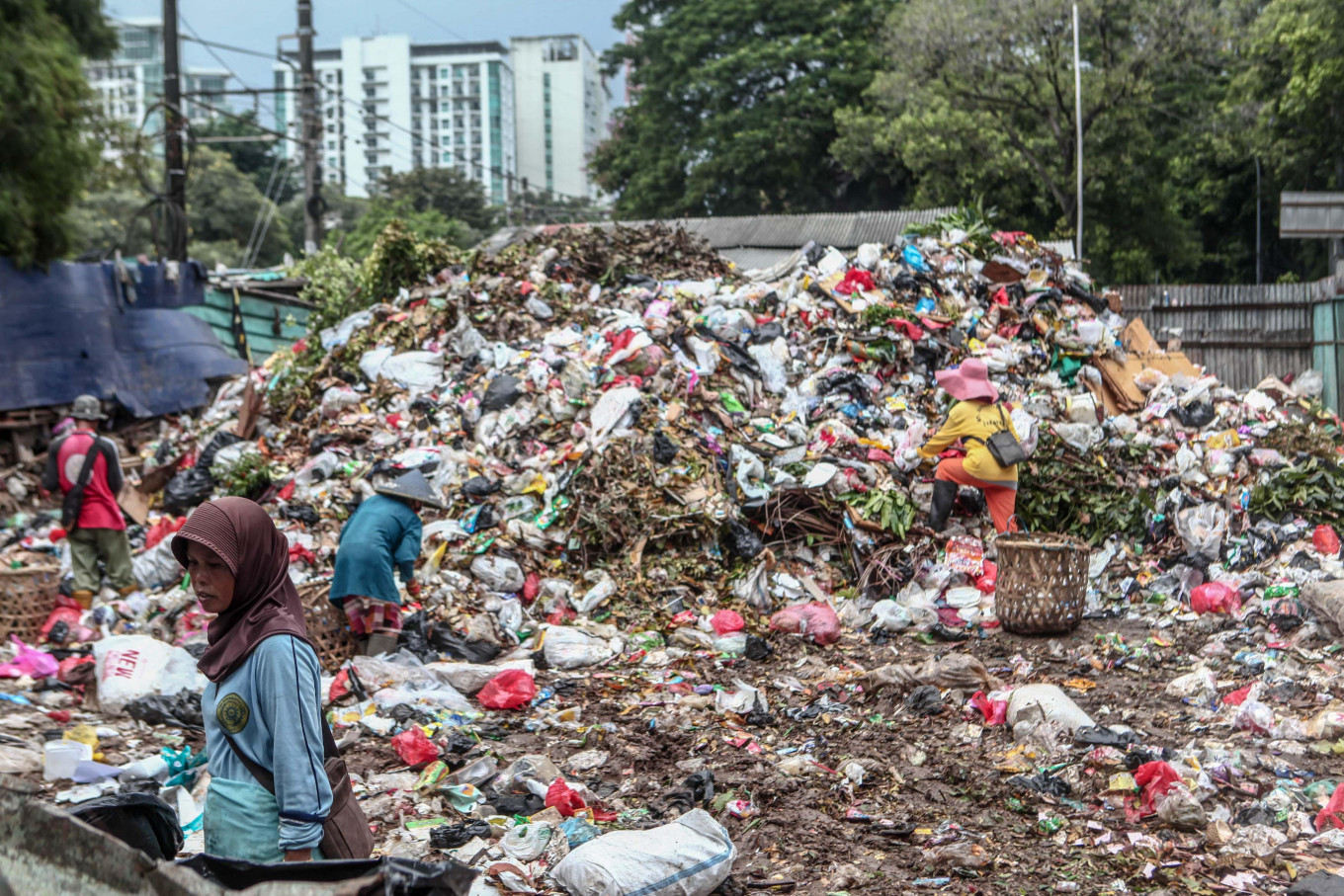Popular Reads
Top Results
Can't find what you're looking for?
View all search resultsPopular Reads
Top Results
Can't find what you're looking for?
View all search resultsJakarta’s trash output down during COVID-19 but environmentalists warn of possible increase
Andhini Miranda, an initiator of the Zero Waste Indonesia movement, said people could use cloth face masks instead of single-use masks, wash their hands frequently with soap instead of wearing gloves and use cloths instead of paper towels to wipe down surfaces with disinfectant
Change text size
Gift Premium Articles
to Anyone
Jakarta may have reduced its trash output during the COVID-19 outbreak, but environmentalists have cautioned that domestic waste could increase, as the longer people stay at home the more often they’ll resort to ordering food and groceries online.
The Jakarta Environment Agency reported that the city’s daily trash output had decreased more than 40 percent, or around 620 tons daily, in early April, two weeks since stay-at-home instructions were announced on March 16. Prior to this, Jakarta produced around 1,500 tons of trash daily, almost all of which was sent to the Bantar Gebang landfill in Bekasi, West Java.
Physical distancing is changing the way people live their lives, their buying habits and the type and amount of domestic waste they generate.
Having worked from home for over a month now, Sandi Nurahman, 31, a resident of Bendungan Hilir, Central Jakarta, said his lifestyle had changed.
Before the outbreak, he ordered food online once a week, but now he is using food delivery services more often, around three to four times a week. He goes out twice a month to shop for groceries.
"Now that we do almost everything at home, we tend to buy food and other daily necessities online," Sandi said.
Read also: Food deliveries, online game purchases up as people stay at home during COVID-19 pandemic
According to e-commerce hub and price comparison site telunjuk.com which surveyed online shopping platforms Tokopedia, Shopee and Bukalapak, there was an estimated 400 percent increase in online purchases of basic necessities between March 2 and April 5.
Chairman of the Indonesian Retailers Association (Aprindo) Roy Mandey said in mid-April that most retailers had seen a fourfold increase in transactions using mobile apps or other delivery services while the number of visits to brick-and-mortar shops had dropped. He also said that transactions had plunged 80 to 85 percent at nonfood retailers and 30 to 40 percent at food retailers since large-scale social restrictions (PSBB) were imposed on April 10.
However, online shopping means goods are shipped via courier services that also use plastic covers, bubble wrap and other packaging, while food deliveries typically come in plastic bags or takeaway food containers. This could lead to an increase in domestic plastic waste.
Jakarta has enacted a ban on single-use plastic bags in traditional markets and modern supermarkets — which will take effect in June — in an effort to cut down on waste. But the policy excludes single-use plastic bags for online shopping and food deliveries.
Read also: Consumer habits force retailers to adapt
Activists have also warned about the increasing public use of face masks, single-use gloves and disposable wipes. Not to mention the growing use of hand sanitizer, the plastic bottles of which could generate extra waste during the pandemic.
“We believe the increase [of waste] will come from the household level instead, from daily consumer goods to personal medical waste, particularly from the use of face masks or gloves,” Greenpeace Indonesia campaigner Atha Rasyadi said.
However, with almost all family members staying at home and doing their activities in self-isolation, waste from shopping malls, eateries and offices would drop instead, activists said. But there is no definitive data yet.
Plastic Bag Diet movement director Tiza Mafira said that although online purchases might have increased, it was only to make up for offline purchases that were no longer possible, and that both methods resulted in plastic waste.
Tiza said that Jakarta Environment Agency should specify the types of waste dumped at Bantar Gebang to provide a clearer picture of what sort of waste was being generated during the pandemic.
Read also: Ride-hailing apps rely on deliveries during pandemic
Andhini Miranda, an initiator of the Zero Waste Indonesia movement, urged people to not turn to single-use daily products, saying that reducing domestic waste was possible even during the pandemic.
People, she said, could use cloth face masks instead of single-use masks, wash their hands frequently with soap instead of wearing gloves and use cloths instead of paper towels to wipe down surfaces with disinfectant.
Andhini, who began living a zero-waste lifestyle in 2012, said that with some extra precautions and preparation before doing groceries, she was even able to continue using reusable bags.
“COVID-19 has not forced our family to switch to disposable products,” she said in a recent virtual public discussion.
The Environment and Forestry Ministry, meanwhile, recently predicted that medical waste from healthcare facilities and hundreds of COVID-19 referral hospitals would increase during the pandemic, particularly from the use of protective gear and other single-use medical equipment. Yet, there is no data on how much medical waste is being produced as a result of COVID-19.










